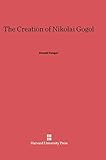The Creation of Nikolai Gogol / Donald Fanger.
Material type: TextPublisher: Cambridge, MA : Harvard University Press, [2013]Copyright date: ©1979Edition: Reprint 2014Description: 1 online resource (300 p.) : 1 FrontispizContent type:
TextPublisher: Cambridge, MA : Harvard University Press, [2013]Copyright date: ©1979Edition: Reprint 2014Description: 1 online resource (300 p.) : 1 FrontispizContent type: - 9780674419285
- 9780674419292
- 891.78/309
- online - DeGruyter
| Item type | Current library | Call number | URL | Status | Notes | Barcode | |
|---|---|---|---|---|---|---|---|
 eBook
eBook
|
Biblioteca "Angelicum" Pont. Univ. S.Tommaso d'Aquino Nuvola online | online - DeGruyter (Browse shelf(Opens below)) | Online access | Not for loan (Accesso limitato) | Accesso per gli utenti autorizzati / Access for authorized users | (dgr)9780674419292 |
Browsing Biblioteca "Angelicum" Pont. Univ. S.Tommaso d'Aquino shelves, Shelving location: Nuvola online Close shelf browser (Hides shelf browser)

|

|

|

|

|

|

|
||
| online - DeGruyter Models for Managing Regional Water Quality / | online - DeGruyter Land of the Millrats / | online - DeGruyter Implementing the Constitution / | online - DeGruyter The Creation of Nikolai Gogol / | online - DeGruyter Midrash, Mishnah, and Gemara : The Jewish Predilection for Justified Law / | online - DeGruyter Lines of Descent : W. E. B. Du Bois and the Emergence of Identity / | online - DeGruyter Malthus : The Life and Legacies of an Untimely Prophet / |
Frontmatter -- Preface -- Acknowledgments -- Contents -- PART I. Approaches -- 1. The Gogol Problem: Perspectives from Absence -- 2. The Sense of Absence: Immediate Contexts -- PART II. Improvising a Vocation -- 3. Beginnings: Miscellaneous Writings -- 4. Beginnings: Fiction -- 5. Confronting a Public, I -- PART III. Embracing a Calling -- 6. Epic Intentions -- 7. Dead Souls: The Mirror and the Road -- 8. Confronting a Public, II -- PART IV. The Surviving Presence -- 9. The Gogolian Universe: Notes Toward a Theory -- 10. Sense, Shape, End -- NOTES / INDEX -- Notes -- Index
restricted access online access with authorization star
http://purl.org/coar/access_right/c_16ec
Nikolai Gogol, Russia's greatest comic writer, is a literary enigma. His masterworks--"The Nose," "The Overcoat," The Inspector General, Dead Souls--have attracted contradictory labels over the years, even as the originality of his achievement continues to defy exact explanation. Donald Fanger's superb new book begins by considering why this should be so, and goes onto survey what Gogol created, step by step: an extraordinary body of writing, a model for the writer in Russian society, a textual identity that eclipses his scanty biography, and a kind of fiction unique in its time. Drawing on a wealth of contemporary sources, as well as on everything Gogol wrote, including journal articles, letters, drafts, and variants, Fanger explains Gogol's eccentric genius and makes clear how it opened the way to the great age of Russian fiction. The method is an innovative mixture of literary history and literary sociology with textual criticism and structural interrogation. What emerges is not only a framework for understanding Gogol's writing as a whole, but fresh and original interpretation of individual works. A concluding section, "The Surviving Presence," probes the fundamental nature of Gogol's creation to explain its astonishing vitality. In the process a major contribution is made to our understanding of comedy, irony, and satire, and ultimately to the theory of fiction itself.
Mode of access: Internet via World Wide Web.
In English.
Description based on online resource; title from PDF title page (publisher's Web site, viewed 24. Aug 2021)


